
Notes From Olympia: Jan. 21, Week 2 of the 2022 Legislative Session
Included in this edition: Trivia, Highlights of the Week, Early Learning Action, Key Hearings and What’s Up Next.
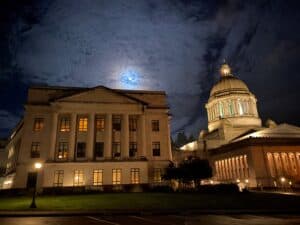
Photo snapped by the author on a morning walk Jan. 18, 2022.
Trivia!
Why is the sundial in the middle of the Capitol campus referred to as the “Territorial Sundial?”
Highlights of the Week
Honoring Dr. Martin Luther King, Jr. Friends and family are often surprised to hear I work on federal holidays such as Dr. Martin Luther King, Jr. Day and Presidents’ Day. While most government-related entities close on federal holidays, the Washington State Legislature meets on both days since they occur during the scheduled legislative session.
The Senate and House of Representatives honored Dr. King on his birthday, with both bodies passing resolutions (SR 8634 and HR 4635) during floor sessions dedicated to Dr. King, his legacy and his call for action (Senate Floor Session Honoring Dr. King and House Floor Session).
Long-Term Care Delay. Much attention has been paid to the implementation of the Washington Cares Fund, the state’s long-term care program created by 2019 legislation and funded by a new payroll tax. A number of logistical (and philosophical) concerns arose as roll-out drew near, and Governor Inslee and legislative leadership agreed to introduce and support legislation that would delay implementation to give time to work out these details.
This 18-month proposed delay is on the fast track, with the House voting the bill off their Floor Wednesday and, according to Senate Majority Leader Andy Billig during a media briefing this week, the Senate should do the same by the end of next week.
Early Learning Action
Joint Work Session on Transitional Kindergarten. Friday, Jan. 14, the House Children, Youth and Families and Education Committees held a work session looking at Transitional Kindergarten services and the alignment with other early learning services. Prior to hearing from community providers about their experiences, staff from both committees provided an overview of various early learning opportunities available to our youngest learners.
Following remarks from providers in various corners of the state, representatives of the Department of Children, Youth and Families and the Office of the Superintendent of Public Instruction gave a presentation on their joint efforts to integrate early learning services for 3- and 4-year olds. Of note, DCYF and OSPI have a Phase 2 report Integrated Early Learning due Sept. 1, 2022 and they are also partnering on coordinated recruitment and enrollment.
According to materials shared during the hearing, Transitional Kindergarten:
- Is an early entrance to Kindergarten.
- Serves children who are age 4 by Aug. 31 without access to high-quality early learning experiences prior to Kindergarten, or who have been deemed, through a screening process and/or other instrument(s), to need additional preparation to be successful in Kindergarten in the following year.
- Programs must start before Jan. 31 and have 27 hours and 45 minutes of weekly instruction.
- Has the same requirements as Kindergarten: staffed by certified teachers and paraprofessionals; developmentally appropriate learning environment that addresses the whole child; and administration of WaKIDS.
- Funding is provided through state prototypical school formulas for Kindergarten students. Statewide, Kindergarten students generate, on average, approximately $11,379 in the 2021-22 school year, but that amount can vary based on regionalization or other factors.
- Current funding is $3 million a year. However, caseloads are projected to expand with a total of $11.8 million projected in spending for the 2021-2022 school year. The Governor’s budget for fiscal year 2023 includes $12.6 million.
- Enrollment of 820 students in 35 districts during the 2020-21 school year (note this was during COVID).
New Bill for Dolly. It was a quiet week for introduction of early learning related bills, but on Dolly Parton’s birthday, Representatives Stonier and Abbarno introduced HB 2068 which would bring the Dolly Parton Imagination Library to families throughout Washington state. Dolly Parton’s Imagination Library provides no-cost books to young children.
Key Hearings
HB 1872 (Senn and Slatter). Wednesday, the House College and Workforce Development Committee held a public hearing on HB 1872 which would establish a care worker center to elevate care sectors as a respected sector of the workforce, increase retention and recruitment and promote the value and different employment options of a care worker. The bill calls out three caregiving professions: child care, long-term care and personal care attendants for people with disabilities.
A number of child care advocates testified on the bill, stressing the importance of increasing compensation for the child care workforce and urging that compensation measures in this bill be tied to the Child Care Collaborative Task Force’s Cost of Quality work. The bill is scheduled for Executive Session in the House College & Workforce Development Committee Jan. 26.
HB 1890 (Callan). Heard in the House Children, Youth and Families Committee Monday and voted out Thursday, HB 1890 brings forward recommendations from the Children and Youth Behavioral Health Workgroup, including a call for the development of a strategic plan and inclusion of compensation of up to $200 a day for individuals with lived experience participating in the workgroup or its advisory bodies. The Committee heard from a range of testifiers speaking to the need to accelerate behavioral health efforts for children and youth as well as the importance of including (and compensating) people with lived experience in policy development. The bill now moves to the House Appropriations Committee for consideration.
SB 5793 (C. Wilson). SB 5793 looks to change current statute to allow for individuals with lived experience participating in state boards, commissions and other workgroups and advisory bodies to be compensated for their engagement. It received a groundswell of support in a Wednesday public hearing in the Senate State Government & Elections Committee and is scheduled for Executive Session (vote) Friday morning – about the time this update hits your inbox.
As a reminder, Start Early Washington’s Resource Page contains a bill tracker with the latest information on bills we are following.
What’s Up Next?
The pace of introduced bills slowed dramatically this week. This is expected because the first deadline (called “cutoff”) is just under two weeks away on Feb. 3 for bills to be voted out of policy committees. Next week, expect full committee hearing schedules as well as the Senate’s focus on the long-term care program delay bills. The House Children, Youth and Families Committee will hold hearings on bills related to the composition of the Department of Children, Youth and Families Oversight Board as well as a bill (HB 1843) which would adjust licensing requirements for child care centers and outdoor early learning programs.
Trivia Answer
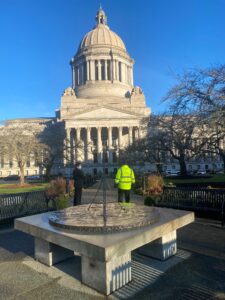
Photo Credit: Erica Hallock, Jan. 18, 2022
The sundial is named the “Territorial Sundial” because it depicts 8 events reflecting regional history before statehood. Situated in a circular court south of the Legislative Building, north of the State Library, west of the John A. Cherberg Building (Senate building) and east of the John L. O’Brien Building (House building), the Territorial Sundial was intended as a focal point to view the various campus buildings. It was dedicated Jan. 23, 1959, along with the opening of the Washington State Library (now known as the Joel M. Pritchard Library). Designed and hand-hammered in brass by artist and craftsman John W. Elliott (1883-1971), the sundial prominently features a quote from Roman Emperor Marcus Aurelius “Time is a sort of river of passing events, and strong is its current.”
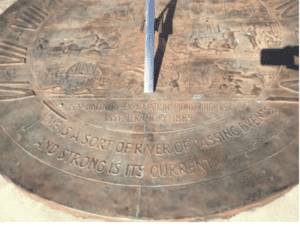
Photo Credit: Thurston Talks
After years of “dialing the sun,” the Territorial Sundial was removed for six months in July 2017 for its first repairs since its installation 59 years prior. This was especially needed because, as years have passed, the sundial was not keeping up its main job of telling time.
I learned how to read a sundial in my Girl Scout days, but it’s been a while. The state’s Department of Enterprise Services has a handy guide on how to read a sundial. Kind of a kick to check out – it’s quite the math problem to figure out the time! I will stick with my phone.
Part of the reason I am writing about the Territorial Sundial is that – pre-COVID – it served as a gathering place. On sunny days, you would see lobbyists sitting on the benches, catching up and looking to grab legislators making their way from the Senate and House office buildings to the Legislative Building. It was common to hear “meet you at the sundial.” I remember being in a hearing when there was a fire alarm. We were all told to gather by the sundial – very reminiscent of school-age fire drills. Before smoking was banned on the campus, you could also catch people there having a cigarette.
The sundial has also been a popular place for public demonstrations. One of the most effective grass roots lobbying efforts in my memory was a 2019 response to proposed legislation that would have affected independent hair stylists who rent booths. If memory serves, I grabbed this picture of hair stylists gathering before a hearing on this bill. The outcry over the bill was overwhelming and the proposal stalled. I’m guessing the most effective lobbying occurred while lawmakers were a captive audience while getting their hair done!
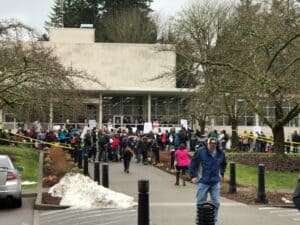
Photo Credit: Erica Hallock, Feb. 20, 2019 (Pre-COVID)
Source Information: Thurston Talks and Washington State Department of Enterprise Services
About the Author
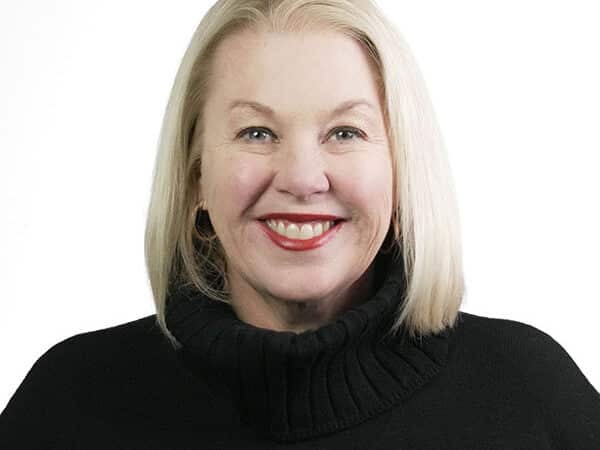
Erica Hallock
Director, Policy & Advocacy, Start Early Washington
Erica Hallock serves as the Director of Policy and Advocacy for Start Early Washington. She has worked in early childhood, health and human services policy in both California and Washington state.
More About Erica